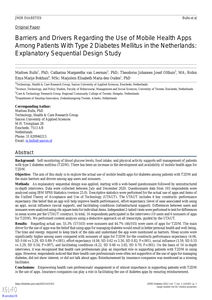andlt;pandgt;Self-monitoring of blood glucose levels, food intake, and physical activity supports self-management of patients with type 2 diabetes mellitus (T2DM). There has been an increase in the development and availability of mobile health apps for T2DM.andlt;/pandgt;
MULTIFILE

This explanatory sequential mixed methods study explores the perceptions of academic and administrative managers responsible for teacher training at a public university in Colombia, as well as their views on improving such training after learning about the performance of teachers student teachers in the 2019 Saber Pro test, the differences in their test scores, and the relationships and statistical correlations between these outcomes and the students’ personal, family, socioeconomic and academic characteristics. Our findings show significant differences in the student teachers’ mean scores and performance when data are grouped according to personal, socioeconomic and academic conditions; a significant relationship between performance and student teacher characteristics; and correlations between critical reading scores and the other competencies assessed. Our data also highlight the lack of knowledge among academic and administrative managers about students’ life circumstances and the diversity of factors that may impact their performance; the importance of correlational data; the difference between expected and true outcomes; the inequity under which students seem to pursue their education; the limitations in access to resources; the training required for teachers to be able to analyze quantitative data and use specific software; the impact of teachers’ critical reading skills on student outcomes; the importance of data-driven decision-making; and the need for teachers to engage in quantitative research practices.
DOCUMENT

E-Exercise is an effective 12-week blended intervention consisting of around five face-to-face physiotherapy sessions and a web-based application for patients with hip/knee osteoarthritis. In order to facilitate effective implementation of e-Exercise, this study aims to identify physiotherapists' experiences and determinants related to the usage of e-Exercise. Methods: An explanatory sequential mixed methods design embedded in a randomized controlled trial comparing e-Exercise with usual physiotherapy in patients with hip/knee osteoarthritis. Usage of e-Exercise was based on recruitment rates of 123 physiotherapists allocated to e-Exercise and objective web-based application usage data. Experiences and determinants related to e-Exercise usage were investigated with a questionnaire and clarified with semi-structured interviews. Results: Of the 123 physiotherapists allocated to e-Exercise, 54 recruited more than one eligible patient, of whom 10 physiotherapists continued using e-Exercise after the study period. Physiotherapists had mixed experiences with e-Exercise. Determinants related to intervention usage were appropriateness, added value, time, workload, professional autonomy, environmental factors, and financial consequences. Physiotherapists recommended to improve the ability to tailor e-Exercise to the individual needs of the patient patients' individual needs. Discussion: Determinants related to the usage of e-Exercise provided valuable information for the implementation of e-Exercise on broader scale. Most importantly, the flexibility of e-Exercise needs to be improved. Next, there is a need for education on how to integrate an online program within physiotherapy
DOCUMENT
